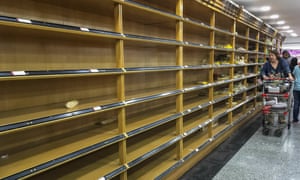
This article is more than
8 year oldIt was the second time Wuilly Arteaga’s violin was damaged during anti-government protests in Caracas, but it was the first time he was injured by police.
Arteaga, who has become a symbol of Venezuela’s protest movement for playing his instrument amid raging street battles, was injured during Sunday’s clashes. Footage from the incident showed police firing rubber bullets and teargas, as protesters threw stones.
Arteaga said the incident reflected an increase in police brutality across the country. “How can one even grasp the fact the National Guard shot me in the face for playing the violin?” he asked.
“On top of the firearms the security forces are using against civilians – which is illegal – they are also deploying armoured vehicles, with which they’ve run over peaceful protesters. Doing that in a generalised and systemic way constitutes a crime against humanity, according to the international criminal court.”
More than 100 people have been killed in the 115 days since anti-government protests began, while hundreds more have been arrested. Violence looks set to continue in the run-up to Sunday’s vote to elect a constituent assembly charged with rewriting the constitution. President Nicolás Maduro has said the move will end the unrest, but his opponents say it is little more than an attempt to consolidate power.
On Tuesday, the country’s biggest business association added its voice to criticism of the government and called on Maduro to cancel the vote. Fedecamaras said the constituent assembly was “unconstitutional and unnecessary” and would not create a solution to the crisis.
“We demand the executive branch abandon its intention to impose a new constitution,” the group said in a statement.
A 48-hour strike is scheduled to begin on Wednesday, while fresh protests have been called for Friday.
Unai Rodrigues, 22, who lives in Caracas and regularly joins protests, said he expected those demonstration to be one of the biggest so far. He claimed police regularly shoot teargas canisters at protesters’ chests and faces to cause as much damage as possible.
“I was not surprised by Wuilly’s injury at all. The police force saw him as a target. He was detained a few days ago, but released a few hours later,” Rodrigues said.
“We will continue fighting. Music is louder than the sound of bullets.”
Jose Santiago, a teacher living in Maracay, a city in north-central Venezuela, said there were barricades at almost every street corner in his city and that many people were scared to go outside for fear of violence.

“Things have certainly changed radically for the protesters, as they are now automatically considered criminals and terrorists, rather than mere peaceful demonstrators, and are slung into jail when caught, instead of just being detained as previously was the case,” he said.
A 51-year-old man was arrested during a protest outside the capital. He is one of many protesters who have been detained since the crackdown on demonstrations began last month. His daughter, who wishes to remain anonymous, said she was provided with little information after his arrest.
“They carried him off on a motorcycle and during this event he was repeatedly beaten on the head until he was almost unconscious. They took him to the governor’s parking lot, where he was kicked hard on the floor,” she said.
“Three hours later he was transferred and a general hearing held for all the detainees two days later. He was charged with disturbing the public order, damages to public property and aggression, the latter is a collective charge, despite being innocent. Then he was taken to prison.”
Victor Candela, 22, who lives in Mérida, a city in western Venezuela, said he was too scared to protest as he lives alone after his family left the country. He echoed concerns about police brutality and illegal treatment of protesters.
“They keep them in horrible places and they don’t give them food or water. Even they don’t allow their families to see them or even to talk to them. Many of the families even don’t know where are their sons, siblings, parents are imprisoned,” he said.
But many protesters, like Arteaga, say they are more certain to turn out than ever. He said that despite his injuries, which require him to rest for at least 15 days, he would attend the protest.
“What Venezuela is going through is a very serious situation. It takes a lot of courage to continue to fight against the barbarism of a narco-government which has departed entirely from legality,” said Arteaga.
“I do feel scared, no one goes to war without fear, but I feel courageous enough to overcome that fear and keep fighting for my country’s freedom.”